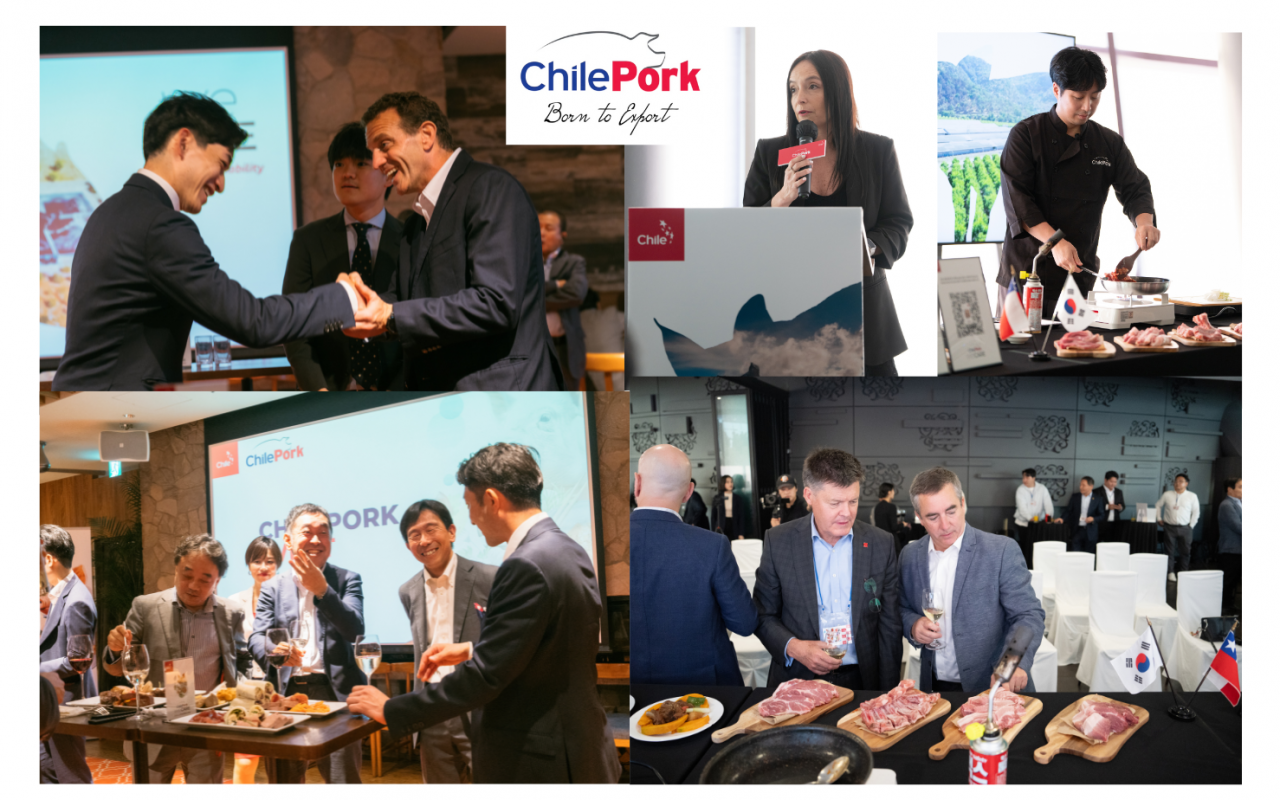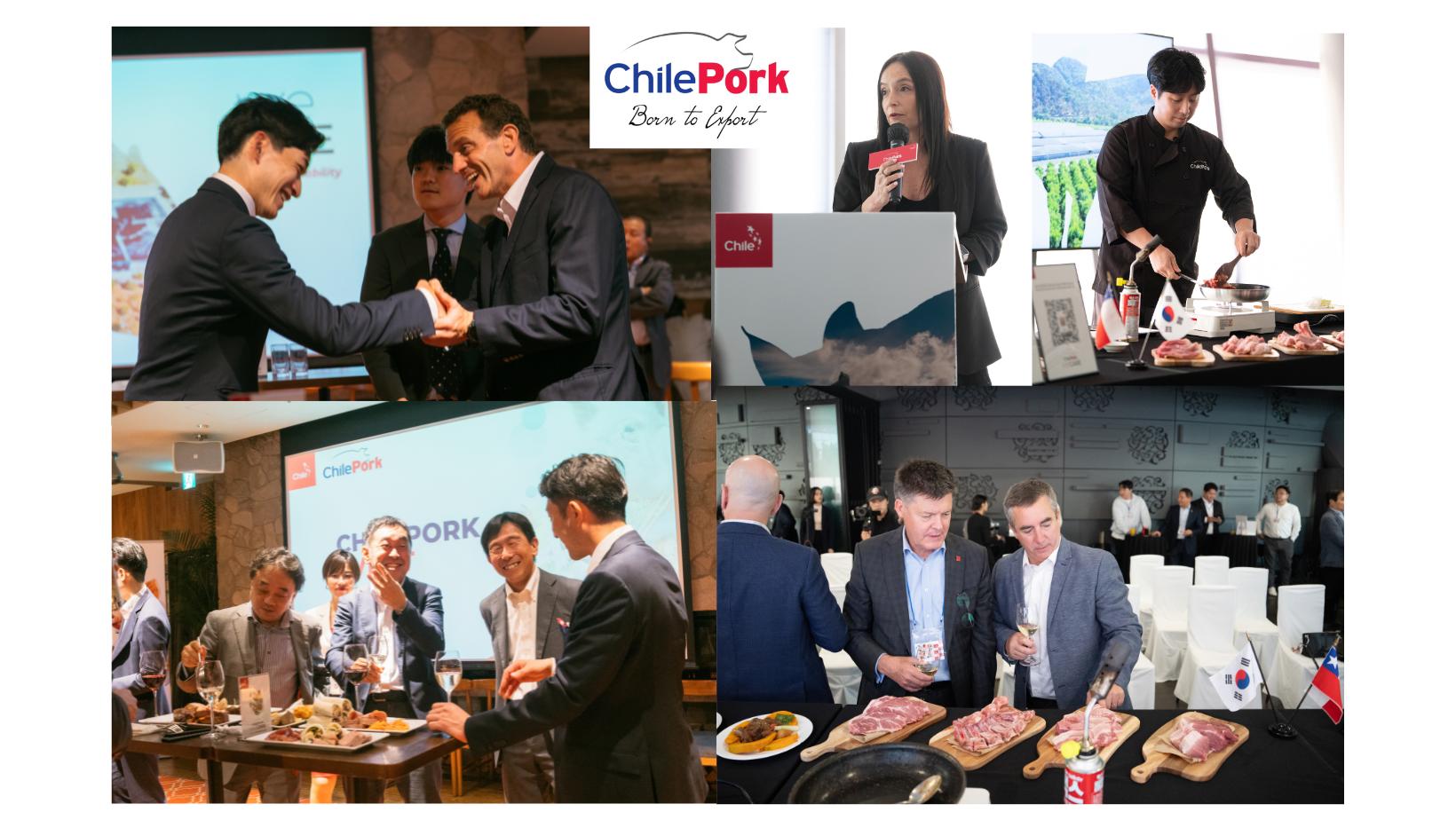
ChilePork launches new brand image in Seoul and Tokyo highlighting Chilean pork’s biosecurity, food safety, and sustainability
To keep boosting trade in two strong markets for Chilean pork, ChilePork’s new image was introduced in South Korea and Japan. It highlights the key pillars of Chilean pork production and exports: biosecurity, food safety, and sustainability. The launch event focused on pork importers, who were invited to a cooking show and a networking event […]

To keep boosting trade in two strong markets for Chilean pork, ChilePork’s new image was introduced in South Korea and Japan. It highlights the key pillars of Chilean pork production and exports: biosecurity, food safety, and sustainability. The launch event focused on pork importers, who were invited to a cooking show and a networking event with Chilean exporters.
Around 60 South Korean and Japanese pork importers attended the events headed by Chilean officials such as Mathias Francke, Ambassador to South Korea; Ricardo Rojas, Ambassador to Japan; and Nury Disegni, Commercial and Agricultural Attaché to Japan. The private sector was represented by Pía Barros, ChileCarne’s Communications and Marketing Manager and representatives from the Chilean pork producing and exporting companies: Agrosuper, Coexca, Maxagro, and AASA, who underscored these events’ role in strengthening trade.
ChilePork’s new brand image and attributes highlight that biosecurity is a priority of Chilean exporters. The South American country presents itself as an “island of biosecurity,” free of diseases such as African swine fever (ASF) and Porcine reproductive and respiratory syndrome (PRRS). This status is kept thanks to strict biosecurity measures that secure each facility and the ongoing collaboration with Chile’s health authority: the Agricultural and Livestock Service (SAG). The efforts include emergency plans for any potential outbreaks, thus ensuring the integrity and quality of exports.
Food safety is another essential pillar. Chilean pork is produced under strict food safety standards, with a production model where companies have control of each process: animal feeding, rearing, processing, and marketing, which guarantees the traceability and quality of the products that reach consumers.
Sustainability is also central to ChilePork’s new image, as it reflects another pillar of its pork production system: a circular economy approach that invests in cutting-edge technology to increase production without compromising natural resources. A whopping 95% of Chile’s pork production complies with the goals of the Chile Conscious Origin sustainability standard, whose indicators are in line with the UN’s Sustainable Development Goals for 2030.
But the launching of ChilePork’s new brand image was not the only milestone to celebrate in both countries; Chile celebrated 20 years of trade relations with South Korea and the positive results in Japan following the entry into force of the Comprehensive and Progressive Agreement for Trans-Pacific Partnership, CPTTP.
In South Korea, Ambassador Mathias Francke commented: “We are here in Seoul, on a pleasant afternoon by the Han River ‒that cuts through the city‒ in a new special activity with ChilePork to promote this product, which is one of the stars of the FTA between Chile and South Korea that is celebrating 20 years. Thanks to pork exports to South Korea, Chile is one of the country’s top five suppliers; and in some cuts we are the second largest vendor. In times when food safety, high prices, and inflation are major concerns in Korea, it’s important for consumers to have access to a safe product, sustainably produced, and accessible. That is why the embassy and its Agricultural Office are supporting ChilePork and the companies in their relationship with Korean partners and officials.”
In Japan, Pía Barros explained that: “The entry into force of the CPTTP helped us stay competitive and continue to be Japan’s sixth pork supplier, increasing our exports by 21% in volume and 25% in value from 2022 to 2023.”
The cooking shows were led by celebrated local chefs: Kim Taesung in South Korea and Maki Watanabe in Japan, who took the guests on a culinary experience showcasing cuts such as belly, collar, tenderloin, and ribs in local dishes, showcasing the quality and versatility of Chilean pork.
Chef Kim said that “Chilean pork is a very popular ingredient among chefs as its quality stands out from other imported meats. The price is reasonable and not too expensive, and as we just saw, it has a nice marbling and flavor. That is why it has become such a popular ingredient. I personally use it for spicy dishes, but also for recipes with boiled meat or others with not much seasoning, because its flavor is mild enough and it doesn’t have a strong odor. I think that’s why Chilean pork is so renowned.”
Japanese chef Watanabe explained, “I find ChilePork meat quite tender and free of any unpleasant odors, which is why it goes very well with Japanese broths. Japanese cuisine has a delicate flavor, and the flavor and sweetness of Chilean pork are the perfect match. I feel that the combination of ChilePork meat and Japanese cuisine is good for ‘quick cooking’.”
This year, the USDA ranking positioned Chile as the fifth largest global pork exporter, a significant achievement for the Chilean industry, which exported 297,000 tons of pork in 2023, valued at $743 million USD. Asia was its main destination, accounting for 73% of the total exported value.
In 2023, pork was the second-most produced meat in Chile, with 38% of total production, and the most exported, accounting for 55% of the total exported volume.
51% of production is exported, and South Korea is Chile’s second-largest destination market, with 22% of the total value, equivalent to 35,000 tons and $164 million USD. In turn, Chile is South Korea’s eighth largest pork supplier.
Japan, in turn, is the third largest destination market for Chilean pork, representing 21% of the total value of exports. According to Trade Map, Chile holds the sixth place among pork suppliers for the Japanese market.
Take a look at ChilePork’s events in South Korea and Japan. And hear what chefs Kim and Watanabe had to say about the quality of Chilean pork.
